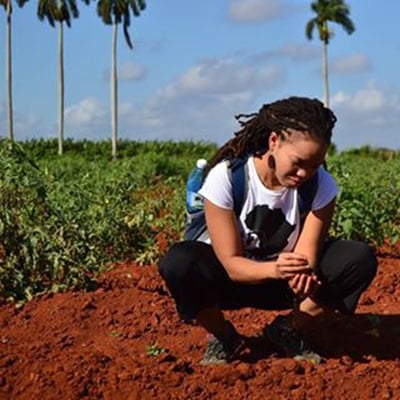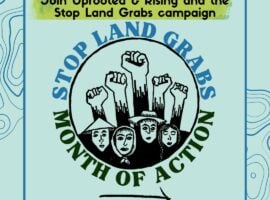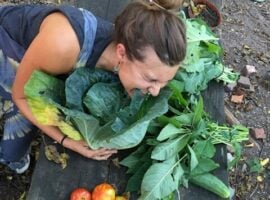To culminate Black History Month we interviewed mother, farmer, activist and scholar-in-training Shakara Tyler and asked her to share her thoughts on the impacts and work that Black people have contributed to our food system. As we continue to fight hunger and poverty, it’s important to recognize the multiple intersections with other struggles within the food justice movement and embrace solutions developed by grassroots leadership. Hope you enjoy and learn something new!
For Black History Month, we want to share important contributions that African Americans have made to our food system/agriculture…what is one of your favorite historical facts or someone whose contribution you wish more people knew about?
There are not enough word space to fully expound on Black peoples’ contribution to our food system and agriculture. Black people have provided the foundation – in conjunction with other indigenous people across the globe – of our agricultural system through labor, cultural knowledge and emotional and psychological sacrifice. A significant part of this foundation is the forgotten, silenced and ignored lives and work of Black women who I believe to be significant birthmothers of Black agrarian land-based resistance. Like Araminta Ross (Harriet Tubman) and Fannie Lou Hamer, the Freedom Quilting Bee (FQB) was a handicraft cooperative (and a member of the Federation of Southern Cooperatives/Land Assistance Fund) that also used their artistic knowledge to develop land-based resistance strategies in 1966. ). Comprised of 60 sharecropping women from across the Southern Black Belt region, the cooperative was housed in Alberta, Alabama and, the collective centered black land ownership in their handicraft efforts. The women sold quilts to supplement their families’ farm incomes. The seed money for the cooperative came from an initial sale of 100 quilts. In 1968, the cooperative bought 23 acres of land. They sold eight lots to families who had been evicted from their homes for registering to vote.
See Jessica Nembhard’s Book, Collective Courage, for more information.
How are you working to connect the black community even more to agriculture and the importance of taking control of your own food system?
I work with Black farming communities on whatever issues they request help with such as financial capital and marketing access, cooperative development, and community outreach and engagement. My primary focus is exploring the development of Black agrarian pedagogies by co-assessing how Black agrarian communities’ personal, cultural and technical capacities can be employed to transform our lived realities.
It is imperative that we pay special attention to how teaching and learning occurs in Black agrarian spaces. In many Black agrarian educational spaces, participants feel the soil, taste the foods grown in that soil, share stories, transform as individuals in community with one another, which in turn transforms our communities themselves. Often times, the socially constructed dichotomies of urban and rural, youth and elder, global north and global south and capitalist and anti-capitalist create barriers that inhibit our teaching and learning in solidarity with one another. If we are going to fully reap the benefits of the self-determining food economies and land-based resistance measures we continue to embark on to transcend the intertwined systems of oppression, we must work in greater solidarity through the dialogue of our various ways of being and knowing.
What are some challenges facing the black community in agriculture and what do you see as possible opportunities or solutions? How can people get involved?
In addition to the common issues faced by many agricultural communities like racism and sexism, land access, financial capital access, marketing access and product viability, the Black agricultural community is also struggling with the need to engage those who are not already aware and committed to principles of Black agrarianism. When we begin to revalorize labor of the land and become more keen of how to systemically exchange our knowledge of the land with one another, we achieve many of the goals and objectives of Black food justice and food sovereignty.
Folks can get involved by getting their hand dirty because many farms are in dire need of labor assistance. If you cannot get dirty on the farm with us, money and equipment donations are deeply appreciated as well. All in all, what is most necessary is rerouting time, labor, money and other resources towards food justice and food sovereignty projects. Our liberations are bound and cannot be attained without working together.
What do you enjoy most about your work in the food justice movement?
One of the most fulfilling components of working for a community self-determined food system is honoring the blood, sweat and tears of my ancestors who fought for food justice and food sovereignty through community land trusts, land and food cooperatives, nature-based spiritualties and more. These blueprints illuminate how our liberation is tied to the land but also extend far beyond the land. By walking the paths of our ancestors, we know we are not alone in this struggle for control over our destinies – our head, hands and hearts have been here before. For this reason, my work with food justice and food sovereignty movements has become a spiritual work of ancestral remembrance and embodied healing.
What’s your favorite traditional meal?
My favorite traditional meal is more of a process than particular cultural dish. I enjoy cooking in community with others with food that was grown with our hands on Black cultivated land. There is no meal more powerful than the one prepared within spaces anointed with Black ancestral knowledge and the unrelenting spirit of Black community self-determination. Black soil, Black land, Black-kept seeds and Black labor prepare the most delicious meals!
#BlackLand, #BlackEcology, #BlackFarmers/Gardeners/Growers, #BlackChefs, #BlackKitchens, #BlackHistory WILL matter!
Shakara is a mother, farmer, activist and scholar. She obtained her B.S. at The Pennsylvania State University in Agricultural Sciences and worked as an urban farm educator for a youth empowerment organization in Philadelphia, PA, and obtained her M.S. at MSU in the Department of Community Sustainability, focusing on Black farmers and civil rights. She is now pursing research in the arenas of food justice and food sovereignty, while working with under-served farmers around land, financial capital, and market accessibility. Regarding our work on Black agrarian pedagogies, she currently employs decolonial theories in her food justice and sovereignty work.
Thank you so much for Shakara for sharing your knowledge with us!






